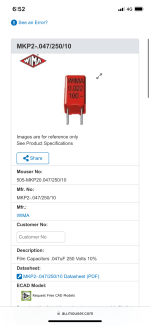Hi all, I have been replacing old passive components from a tube amp and have seen that people think a polypropylene cap is better than a polyester cap and was seeing if you thought it was a good idea to replace them. They are 0.047uf 250v. I’ve included a pic of a cap that I plan on replacing and a photo of replacement. Also is there a better replacement for this polyester cap?
Thanks in advance
Matt
Thanks in advance
Matt
Attachments
Check and see if any of these CDE film/foil pp caps will fit the board properly. That is also important.
https://www.cde.com/resources/catalogs/716p.pdf
716P47394K
716P47396L
716P47398L
716P473910L
716P473912M
https://www.cde.com/resources/catalogs/716p.pdf
716P47394K
716P47396L
716P47398L
716P473910L
716P473912M
As long as you don't mind their nonlinearities.For coupling caps paper in oil are best.
Tom
Tom, you are wrong- misinform others. Paper in oil are most linear of all capacitors. It is shown on thiis site.
https://jacmusic.com/techcorner/SBENCH-PAGES/sbench102/caps.html
https://jacmusic.com/techcorner/SBENCH-PAGES/sbench102/caps.html
Unfortunately I don’t have a schematic but you can see the orange polyester cap in this photo. I don’t understand exactly what the job they do is as I’m new to this. So I really appreciate your help.Polyester capacitors have higher distortion than polypropylene caps. There might be other drawbacks as well. The Wima MKP are good caps.
Whether or not a replacement will make any difference depends on how the capacitor is used in the circuit. Do you have a schematic?
Tom
Attachments
I am happy for any advice as to what would be the right cap for this job. It is a really nice amp so I don’t mind spending a little money to get a bit more out of it. I understand that I need to get the right uf and voltage but don’t really understand which caps are better for each job in terms of what materials they are made from.
Thanks again
Thanks again
Thanks I will look into it after I finish work. And you believe this is my best option?Check and see if any of these CDE film/foil pp caps will fit the board properly. That is also important.
https://www.cde.com/resources/catalogs/716p.pdf
716P47394K
716P47396L
716P47398L
716P473910L
716P473912M
Thanks heaps
Matt
Walter G. Jung and Richard Marsh wrote the definitive article about capacitors called "Picking Capacitors" 44 years ago (1980)
The original article is here: https://www.scribd.com/doc/24913258/Picking-Capacitors (Select full screen to read on line)
There is also another copy here: https://www.reliablecapacitors.com/information/picking-capacitors.html
It's a long read but you will learn a lot. Be sure to read about capacitor DA (dielectric absorption) as it affects the sound. In general teflon and polypropylene have the least DA and pass high frequencies best. PIOs are the slowest with lots of DA. Mylars are near the middle.
The original article is here: https://www.scribd.com/doc/24913258/Picking-Capacitors (Select full screen to read on line)
There is also another copy here: https://www.reliablecapacitors.com/information/picking-capacitors.html
It's a long read but you will learn a lot. Be sure to read about capacitor DA (dielectric absorption) as it affects the sound. In general teflon and polypropylene have the least DA and pass high frequencies best. PIOs are the slowest with lots of DA. Mylars are near the middle.
If you read the article you must make of it what you will. The choice of capacitors depends on several things. PIOs sound the best to you. But, for example, suppose you have an amplifier with an OPT that isn't the best at high frequencies and you would like more. Choosing a low DA cap may improve the HF response. I also like PIO caps in audio. For decades that's all there was. And the old electronics worked well with them. But here's a quick story. Years ago after I read the article I replaced them in my Ampex 351 tape machine electronics with polypropylene and some polystyrene types. It peaked the HFs too much and I needed to remove them. But in most tube amps with OPTs they sound just fine. To argue which is less or more linear is BS. I seriously doubt that the vast majority of people here have the equipment, know how or ability to truly measure that. And remember, personal opinions are like butt holes. Everybody has one and they all stink.
Sorry it is a tube amp. It has 2-12ax7 on the pre circuit and 3 -el34’s in parallel on each channel. It’s class a. ThanksBeing solid-state amp polypropylene is likely your only option and it is good.
Tom, you are wrong- misinform others. Paper in oil are most linear of all capacitors. It is shown on thiis site.
https://jacmusic.com/techcorner/SBENCH-PAGES/sbench102/caps.html
Those measurements are only one aspect Tubesaregreat. Other aspects are materials used, termination techniques
affecting internal inductance, internal resistance due to conductor thickness etc.
Virtually no capacitor is accurate in absolute terms, but one or two are extremely close, such as Mundorf EVO and
EVO in oil aluminum.
Orange drops along with most other capacitors are poor but if the design calls for them, then the designer attempted
to compensate for their performance in other areas. That does not mean two wrongs make a right though.
cheers
pos
That`s your opinion, i think they muffled and lacking treble. Polypropylens are way to go. CDE 940 series are good caps.For coupling caps paper in oil are best. Low cost Russian K40Y-9 are best and only a few dollars each as listed on eBay.

- Home
- Amplifiers
- Tubes / Valves
- Polyester metallized film cap vs polypropylene metallized film cap


